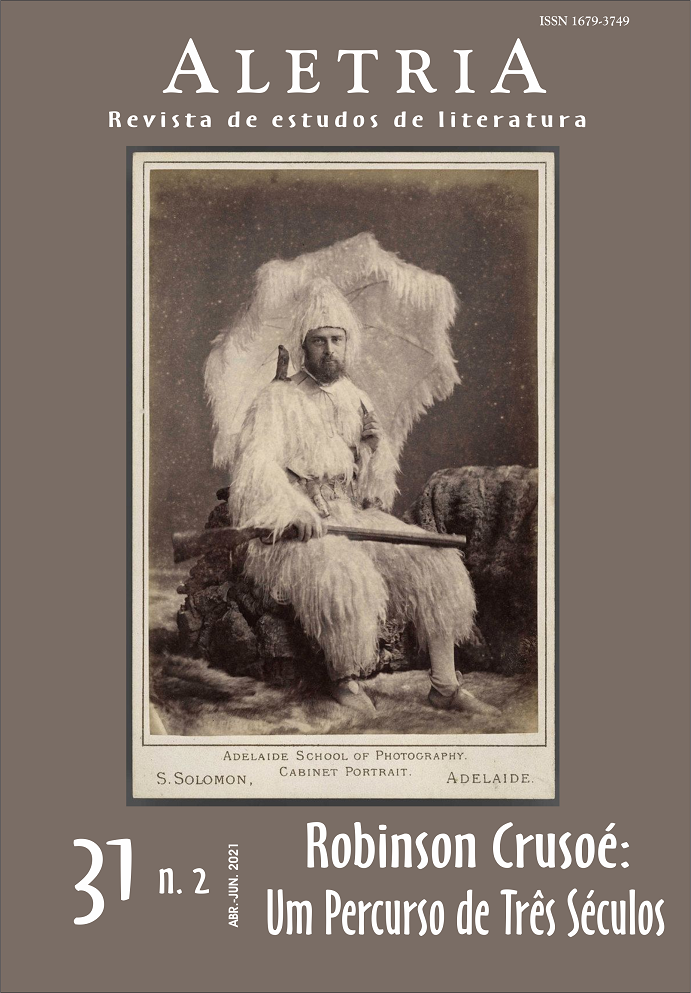The Uncanny Writing from the Perspective of Two Children
DOI:
https://doi.org/10.35699/2317-2096.2021.29284Keywords:
uncanny , disaster , Manoel de Barros , Maurice Blanchot , Sigmund FreudAbstract
Considering the Reading of Sigmund Freud’s O infamiliar [Das Unheimliche] (1919), this article aims to analyze the construction of the poetic word in its constant confrontation with the uncanny, that is constituted as the inventive and drive basis of the writer as a child-character of his own texts. This analysis is based on the study of a fragment of Maurice Blanchot’s L’écriture du désastre, entitled “(A primitive scene?)” and on Manoel de Barros’s Poeminha em língua de brincar. A progressive dialogue takes place between these two authors regarding the inventive potential of the child in creating and/or imagining something from the uncanny, which beyond a scene or a specific act that may cause a possible trauma can be found on the poetic word itself. Thus, through the child perspective, a reflection of how the uncanny appears on Manoel de Barros’s poem and on Maurice Blanchot’s poetic-writing is proposed.
References
BADIOU, Alain. Em busca do real perdido. Tradução de Fernando Scheibe. Belo Horizonte: Autêntica Editora, 2017.
BARROS, Manoel de. Poeminha em língua de brincar. São Paulo: Companhia das Letrinhas, 2019.
BATAILLE, Georges. A experiência interior: seguida de Método de meditação e Postscriptum 1953. Tradução de Fernando Scheibe. Belo Horizonte: Autêntica Editora, 2016.
BLANCHOT, Maurice. A parte do fogo. Tradução de Ana Maria Scherer. Rio de Janeiro: Editora Rocco, 1997.
BLANCHOT, Maurice. L’écriture du désastre. Paris: Gallimard, 1980.
BLANCHOT, Maurice. O espaço literário. Tradução de Álvaro Cabral. Rio de Janeiro: Editora Rocco, 1987.
DERRIDA, Jacques. Demeure: Maurice Blanchot. Paris: Éditions Galilée, 1998.
FREUD, Sigmund. Arte, literatura e os artistas. Tradução de Ernani Chaves. Belo Horizonte: Autêntica Editora, 2018.
FREUD, Sigmund. História de uma neurose infantil: [“O homem dos lobos”], Além do princípio do prazer e outros textos (1917-1920). Tradução de Paulo César de Souza. São Paulo: Companhia das Letras, 2010. (Obras Completas, v. 14).
FREUD, Sigmund. O infamiliar [Das Unheimliche]; seguido de O Homem da Areia, de E. T. A. Hoffmann. Tradução de Ernani Chaves, Pedro Heliodoro Tavares e Romero Freitas. Belo Horizonte: Autêntica Editora, 2019. (Obras Incompletas de Sigmund Freud).
MONTAIGNE, Michel de. Ensaios. Tradução e notas de Sérgio Milliet. São Paulo: Editora 34, 2016.
ROUDINESCO, Elisabeth. Dicionário amoroso da psicanálise. Tradução de André Telles. Rio de Janeiro: Zahar, 2019.
SÓFOCLES. Édipo Rei de Sófocles. Tradução de Trajano Vieira. São Paulo: Perspectiva, 2016.
Downloads
Published
Issue
Section
License
Copyright (c) 2021 Davi Andrade Pimentel (Autor)

This work is licensed under a Creative Commons Attribution 4.0 International License.
Authors who publish with this journal agree to the following terms:Authors retain copyright and grant the journal right of first publication with the work simultaneously licensed under a Creative Commons Attribution Non-Commercial No Derivatives License that allows others to share the work with an acknowledgement of the work's authorship and initial publication in this journal.Authors are able to enter into separate, additional contractual arrangements for the non-exclusive distribution of the journal's published version of the work (e.g., post it to an institutional repository or publish it in a book), with an acknowledgement of its initial publication in this journal.Authors are permitted and encouraged to post their work online (e.g., in institutional repositories or on their website) prior to and during the submission process, as it can lead to productive exchanges, as well as earlier and greater citation of published work (See The Effect of Open Access).





